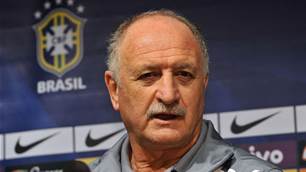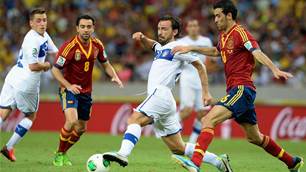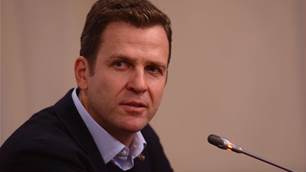While it may be eight years ago, South Korea's run to the semi-finals of the 2002 World Cup is still fresh in the memory of fans and anything less than reaching the last 16 in South Africa will likely be viewed as failure.
Following that performance in 2002 under Guus Hiddink, the Korean Football Association (KFA) employed a string of foreign coaches in the hope of replicating the Dutchman's success.
Each appointment, however, flattered to deceive and they turned to local coach Huh Jung-moo in 2007 in the hope he could bring the success the fans craved.
Huh made a slow start but successfully guided South Korea to this summer's World Cup as they ultimately breezed through qualifying, but they will face a tough task to progress to the knockout stages after being drawn in Group B alongside Argentina, Greece and Nigeria.
Nevertheless, Huh is unwavering in his goal of reaching the last 16 as the 55-year-old looks to sign off on a high before retiring.
"It is one of the toughest groups but we are confident that we can complete our mission," he said.
"After going through Asia's fierce qualifying campaign to seal our spot at the World Cup, the team is competition-hardened and by the time the tournament kicks off we will be prepared to challenge all odds."
South Korea are arguably Asia's most successful World Cup campaigners, having qualified for eight editions overall and the last seven in succession.
Their first experience was far from memorable as jet-lag and lack of training time contributed to them losing 9-0 and 7-0 to Hungary and Turkey respectively at the 1954 World Cup in Switzerland.
It took them 32 years before they made the finals again, when they qualified for Mexico in 1986, but it was not until 2002 that South Korea finally registered their first victory in the finals.
The Taeguk Warriors' stunning run captured the country's imagination but it was brought to an end by Germany in the last four with Michael Ballack's 75th-minute goal sealing a 1-0 victory.
That performance, though, saw football overtake baseball as the country's most popular sport and fans were desperate for the team to build on that run.
Hiddink left shortly after and the KFA first turned to Portuguese coach Humberto Coelho before Dutchmen Jo Bonfrere, Dick Advocaat and Pim Verbeek all had a spell in charge.
However, they all largely failed to make an impression with only Advocaat achieving something of note by guiding South Korea to their first World Cup finals win on foreign soil when they beat Togo 2-1 in Germany 2006.
After snubs from Gerard Houllier and Mick McCarthy, the KFA opted to turn to Huh, much to the disappointment of local fans due to his uninspiring record as a club manager and in his previous spells with the national team.
Huh's cause was not helped as he got off to a slow start with some lacklustre performances during the third round of qualifying, but things started to come together as three wins and three draws ensured they finished top of their group to progress to the final qualification round.
Despite some potentially tricky matches with rivals North Korea and Middle East heavyweights Iran and Saudi Arabia, South Korea ultimately qualified for the finals with ease as they again went unbeaten to top the group and finish four points clear of their Korean rivals.
A 27-match unbeaten run under Huh was brought to an end with a 1-0 defeat to Serbia last November and some disconcerting results this year, such as a 4-2 loss to Zambia and a 3-0 surrender to China, has raised some concerns ahead of the World Cup.
South Korea's biggest problem is the lack of depth in their squad and they will be heavily reliant on the performances of Manchester United's Park Ji-sung and Bolton winger Lee Chung-yong.
To reach the last 16 will be a tough task but if they get off to a good start with a win over Greece in their opening game and their key players are on form, they may have a chance of reaching the knockout stage, something Huh sees as the absolute minimum goal.
"We finished semi-finalists in 2002 but, aside from this, we have never progressed beyond the group stage playing outside Asia," he added.
"So our first target is to reach the round of 16 and, should we make it, we will definitely strive to go one better."
Each appointment, however, flattered to deceive and they turned to local coach Huh Jung-moo in 2007 in the hope he could bring the success the fans craved.
Huh made a slow start but successfully guided South Korea to this summer's World Cup as they ultimately breezed through qualifying, but they will face a tough task to progress to the knockout stages after being drawn in Group B alongside Argentina, Greece and Nigeria.
Nevertheless, Huh is unwavering in his goal of reaching the last 16 as the 55-year-old looks to sign off on a high before retiring.
"It is one of the toughest groups but we are confident that we can complete our mission," he said.
"After going through Asia's fierce qualifying campaign to seal our spot at the World Cup, the team is competition-hardened and by the time the tournament kicks off we will be prepared to challenge all odds."
South Korea are arguably Asia's most successful World Cup campaigners, having qualified for eight editions overall and the last seven in succession.
Their first experience was far from memorable as jet-lag and lack of training time contributed to them losing 9-0 and 7-0 to Hungary and Turkey respectively at the 1954 World Cup in Switzerland.
It took them 32 years before they made the finals again, when they qualified for Mexico in 1986, but it was not until 2002 that South Korea finally registered their first victory in the finals.
The Taeguk Warriors' stunning run captured the country's imagination but it was brought to an end by Germany in the last four with Michael Ballack's 75th-minute goal sealing a 1-0 victory.
That performance, though, saw football overtake baseball as the country's most popular sport and fans were desperate for the team to build on that run.
Hiddink left shortly after and the KFA first turned to Portuguese coach Humberto Coelho before Dutchmen Jo Bonfrere, Dick Advocaat and Pim Verbeek all had a spell in charge.
However, they all largely failed to make an impression with only Advocaat achieving something of note by guiding South Korea to their first World Cup finals win on foreign soil when they beat Togo 2-1 in Germany 2006.
After snubs from Gerard Houllier and Mick McCarthy, the KFA opted to turn to Huh, much to the disappointment of local fans due to his uninspiring record as a club manager and in his previous spells with the national team.
Huh's cause was not helped as he got off to a slow start with some lacklustre performances during the third round of qualifying, but things started to come together as three wins and three draws ensured they finished top of their group to progress to the final qualification round.
Despite some potentially tricky matches with rivals North Korea and Middle East heavyweights Iran and Saudi Arabia, South Korea ultimately qualified for the finals with ease as they again went unbeaten to top the group and finish four points clear of their Korean rivals.
A 27-match unbeaten run under Huh was brought to an end with a 1-0 defeat to Serbia last November and some disconcerting results this year, such as a 4-2 loss to Zambia and a 3-0 surrender to China, has raised some concerns ahead of the World Cup.
South Korea's biggest problem is the lack of depth in their squad and they will be heavily reliant on the performances of Manchester United's Park Ji-sung and Bolton winger Lee Chung-yong.
To reach the last 16 will be a tough task but if they get off to a good start with a win over Greece in their opening game and their key players are on form, they may have a chance of reaching the knockout stage, something Huh sees as the absolute minimum goal.
"We finished semi-finalists in 2002 but, aside from this, we have never progressed beyond the group stage playing outside Asia," he added.
"So our first target is to reach the round of 16 and, should we make it, we will definitely strive to go one better."
Copyright (c) Press Association
Related Articles

Scolari delighted with Brazil display

Spain versus Italy to go ahead













